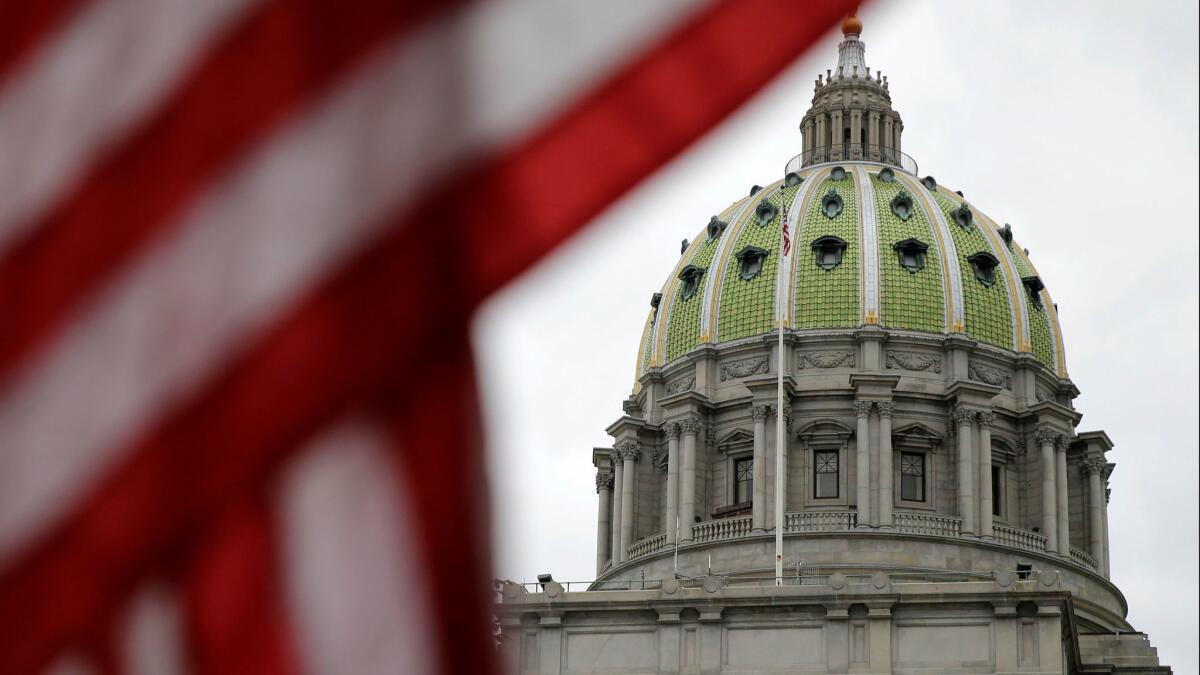What’s the matter with Pennsylvania? Trumpism and blind partisanship

- Share via
The death last week of former Pennsylvania Gov. Dick Thornburgh coincided with continuing resistance by Republicans in my home state to President-elect Joe Biden’s 80,000-vote victory there. The juxtaposition was a reminder of how the Republican Party in Pennsylvania has changed for the worse.
Thornburgh, who also served as U.S. attorney general under Presidents Ronald Reagan and George H.W. Bush, was typical of the sort of sane and centrist leaders produced by the Republican Party when I lived and worked in the state prior to moving to Washington, D.C., in 2003. Yes, there were hard-line conservative Republicans in Pennsylvania, but prominent Republicans in the Legislature, Congress and the governor’s mansion were rational and committed to good government.
Now consider what prominent Republicans are doing to thwart the will of the state’s voters in the presidential election.
* Rep. Mike Kelly, a Republican member of Congress, was the leading figure in a lawsuit asking the U.S. Supreme Court to issue an injunction nullifying the certification of Biden’s victory in Pennsylvania. Kelly and others claimed that the Pennsylvania Legislature had violated the state Constitution in 2019 when it expanded voting by mail. The Supreme Court rejected the lawsuit on Dec. 8, though Kelly still hopes that the court will hear their appeal on the merits with an eye toward future elections.
* Seven Republican members of Congress from Pennsylvania joined more than 100 other House Republicans in signing a brief supporting the state of Texas in its absurd attempt to overturn the election results in Pennsylvania and three other states carried by Biden. This lawsuit also was rejected by the Supreme Court.
*Those same House members, joined by an eighth member from Pennsylvania, said last week that they will vote against certification of Pennsylvania’s electors on Wednesday when Congress meets Wednesday in a joint session for the counting of electoral votes.
* Sixty-four Republicans in the state Legislature wrote a letter to Pennsylvania’s congressional delegation on Dec. 4 urging senators and representatives to object to counting Biden’s electoral votes from their state.
* Republican state senators from Pennsylvania staged a “hearing” at a Gettysburg hotel at which Trump lawyer Rudolph W. Giuliani suggested that more than 682,000 ballots in Allegheny and Philadelphia counties should be thrown out because they weren’t inspected by GOP observers. Trump phoned in to the meeting to claim that the election was “rigged” and “has to be turned around.”
What’s going on here?
Terry Madonna, the longtime director of the Center for Politics and Public Affairs at Franklin and Marshall College who this year is returning to Millersville University, said that partisanship and polarization are at their height in Pennsylvania, a state with a Democratic governor and a Republican-controlled Legislature and deep ideological differences between the parties.
The friction isn’t all about the election. Democratic Gov. Tom Wolf and Republicans also have clashed over restrictions Wolf has ordered to combat the COVID-19 pandemic. But partisanship should stop at questioning the outcome of a fair election that your candidate happened to lose.
Not every prominent Pennsylvania Republican has rallied to Trump’s side or worked to undermine Biden’s victory.
U.S. Sen. Pat Toomey congratulated the president-elect late in November, saying that Trump had “exhausted all plausible legal options to challenge the result of the presidential race in Pennsylvania.” On Saturday, Toomey condemned the plan by Sen. Ted Cruz of Texas and other Republicans to challenge Biden electors, saying that their challenge would undermine “the right of the people to elect their own leaders.” (Toomey isn’t seeking reelection.)
Still, significant numbers of elected Republicans in Pennsylvania, a state with a history of bipartisanship and good government, have made it clear that they are willing to undermine the democratic process on the basis of contrived legal theories rather than alienate Trump and his supporters. And they have lots of company in other states.
What’s the matter with Pennsylvania? The same maladies that afflict the rest of the country: poisonous partisanship and a Trump personality cult that persists even after his defeat.
More to Read
Updates
8:57 a.m. Jan. 5, 2021: This post has been updated to note that Terry Madonna is returning to Millersville University.
A cure for the common opinion
Get thought-provoking perspectives with our weekly newsletter.
You may occasionally receive promotional content from the Los Angeles Times.










